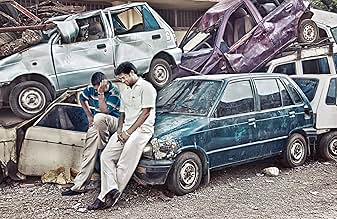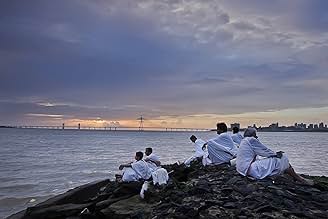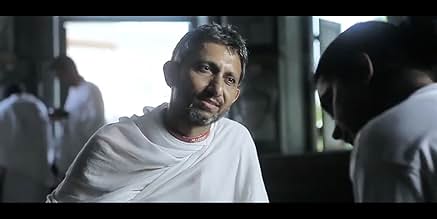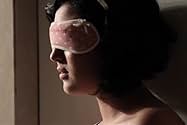VALUTAZIONE IMDb
8,0/10
8139
LA TUA VALUTAZIONE
Il film esplora i temi di identità, giustizia, bellezza, significato e morte mediante un fotografo sperimentale, un monaco malato e un giovane agente di cambio.Il film esplora i temi di identità, giustizia, bellezza, significato e morte mediante un fotografo sperimentale, un monaco malato e un giovane agente di cambio.Il film esplora i temi di identità, giustizia, bellezza, significato e morte mediante un fotografo sperimentale, un monaco malato e un giovane agente di cambio.
- Regia
- Sceneggiatura
- Star
- Premi
- 12 vittorie e 13 candidature totali
Aydah El-Kashef
- Aliya
- (as Aida El-Kashef)
Yogesh Shah
- Doctor
- (as Dr. Yogesh Shah)
Recensioni in evidenza
Ship of Theseus is a movie which we need but didn't really deserve right now. A lot of things have already been said about it, so with the risk of sounding repetitive, however I'll try not to be so, here are some of my thoughts: 1. To begin with, Anand Gandhi has made an utterly brilliant movie. The honesty, genuineness, and intent of the director is clear from the word go which is a sheer pleasure to see in an Indian filmmaker.
2. Three stories - totally different to each others in terms of mood and narration, yet so well transitioned that you don't even notice it. Two thumbs up for the screenplay and editing.
3. Utterly brilliant cinematography, a visual delight which mesmerizes you and grips you with every scene and its details that is on the screen. After I exited the theater, I couldn't believe I watched an Indian movie looking so beautiful. In fact, I can go on and on about the imagery. Well done! 4. Superb dialogues (and the use of no dialogues) - At times, zen, and other times, so passionate that you feel like talking to your alter ego, just like, the conversations in Zen and the Art of Motorcycle Maintenance. Even the humorous and satirical parts don't make you feel like they are used as punches, except a couple times maybe.
5. Acting - Top notch by the all three protagonists. Relatively good performance by the other actors as well. But the three main actors are so good you long to see more of them. And the sympathies and your connections with them find their peaks in the penultimate scene.
6. Only thing where I felt I had issue is that some scenes and conversations were finished in a hurry. While one talk about something so powerful in detail, it should be a complete conversation, whereas, at times, it appears a lot of important things were skipped (esp. in story #2). Though I didn't find too many things wrong with the conversations in story 2 and narrations in story 2 and 3, it looked to me that something was amiss, they could have talked a little more, and so on. The movie could have been even more powerful, given the premise and ideas it began with. Actually, the idea is itself so big and extensive that any less would feel like incomplete. Such as, writing about this movie in 140 characters. But I guess I shouldn't complain as it's a movie where it's very difficult to have such kind of narration as well as a speech as long as that of John Galt. Anyways, I am more than glad that such things were talked about in a movie made in India.
Bravo, Anand Gandhi and the team! I stood and clapped for you all when the movie ended in the theater.
2. Three stories - totally different to each others in terms of mood and narration, yet so well transitioned that you don't even notice it. Two thumbs up for the screenplay and editing.
3. Utterly brilliant cinematography, a visual delight which mesmerizes you and grips you with every scene and its details that is on the screen. After I exited the theater, I couldn't believe I watched an Indian movie looking so beautiful. In fact, I can go on and on about the imagery. Well done! 4. Superb dialogues (and the use of no dialogues) - At times, zen, and other times, so passionate that you feel like talking to your alter ego, just like, the conversations in Zen and the Art of Motorcycle Maintenance. Even the humorous and satirical parts don't make you feel like they are used as punches, except a couple times maybe.
5. Acting - Top notch by the all three protagonists. Relatively good performance by the other actors as well. But the three main actors are so good you long to see more of them. And the sympathies and your connections with them find their peaks in the penultimate scene.
6. Only thing where I felt I had issue is that some scenes and conversations were finished in a hurry. While one talk about something so powerful in detail, it should be a complete conversation, whereas, at times, it appears a lot of important things were skipped (esp. in story #2). Though I didn't find too many things wrong with the conversations in story 2 and narrations in story 2 and 3, it looked to me that something was amiss, they could have talked a little more, and so on. The movie could have been even more powerful, given the premise and ideas it began with. Actually, the idea is itself so big and extensive that any less would feel like incomplete. Such as, writing about this movie in 140 characters. But I guess I shouldn't complain as it's a movie where it's very difficult to have such kind of narration as well as a speech as long as that of John Galt. Anyways, I am more than glad that such things were talked about in a movie made in India.
Bravo, Anand Gandhi and the team! I stood and clapped for you all when the movie ended in the theater.
Anand Gandhi's first feature-length film is an intriguing and thought-provoking piece of Independent cinema; it deals with life, purpose and philosophy. Gandhi's prior experience with short films helps him direct the three disparate story lines with certain finesse; the stories shed some light on Theseus's Paradox and give a transcendent look at consequences arising from individual actions.
In Greek Legend, according to Plutarch, Theseus's ship was preserved, and the decayed parts were replaced piece by piece until no part of the original ship remained. Plutarch asks whether you would call it the same ship or not. The paradox might seem too confusing to discuss, but Anand Gandhi just uses this to connect the three plots through the theme of organ donation, questioning identity in the face of change. Rather than making a statement, Gandhi just raises interest and discusses various important philosophies and issues; having compelling arguments for and against the topics, it helps us being a part of the discussion.
The characters are likable and interesting. All the actors have done a commendable job, and Neeraj Kabi's brilliant performance as the Jain monk stands out. As the three stories go, the first one (with the blind Egyptian photographer) deals with behaviour to change, the second one (with the animal-rights supporting Jain monk) might seem more philosophically and intellectually orgasmic, but it's the third one (with a stock broker seeking justice for a kidney scam victim) which oozes with brutal honesty. The use of humour to lighten the serious tone of the movie is delightful.
The cinematography is spectacular. Rarely have I seen such breathtaking visuals in an Independent film; the shots have a certain poetic and aesthetic charm. The blend of far-off shots and sudden close-ups gives us an intimate look at the characters' lives.
The movie is really good, but far from perfection. 2 hours 20 minutes is too long for the movie; with better editing, it could have maintained the pace and momentum well. And as most movies with multiple story lines suffer from this, the characters lack enough depth and screen-time for us to invest ourselves in them. The first story, though the idea of a blind photographer is a bit far-fetched, suffers from an abrupt ending. The second story has many interesting viewpoints and arguments, but part of them seem off-the-book and pretentious; it suffers from an illogical ending too. The third story, though quite honest and absorbing, is quite messy and detours from the main theme of the movie.
From writing screenplay and dialogues for cheesy soap operas to an intellectual independent feature film, Anand Gandhi has come a long way; I guess his experience as a playwright and short-film director must have come in handy.
In Greek Legend, according to Plutarch, Theseus's ship was preserved, and the decayed parts were replaced piece by piece until no part of the original ship remained. Plutarch asks whether you would call it the same ship or not. The paradox might seem too confusing to discuss, but Anand Gandhi just uses this to connect the three plots through the theme of organ donation, questioning identity in the face of change. Rather than making a statement, Gandhi just raises interest and discusses various important philosophies and issues; having compelling arguments for and against the topics, it helps us being a part of the discussion.
The characters are likable and interesting. All the actors have done a commendable job, and Neeraj Kabi's brilliant performance as the Jain monk stands out. As the three stories go, the first one (with the blind Egyptian photographer) deals with behaviour to change, the second one (with the animal-rights supporting Jain monk) might seem more philosophically and intellectually orgasmic, but it's the third one (with a stock broker seeking justice for a kidney scam victim) which oozes with brutal honesty. The use of humour to lighten the serious tone of the movie is delightful.
The cinematography is spectacular. Rarely have I seen such breathtaking visuals in an Independent film; the shots have a certain poetic and aesthetic charm. The blend of far-off shots and sudden close-ups gives us an intimate look at the characters' lives.
The movie is really good, but far from perfection. 2 hours 20 minutes is too long for the movie; with better editing, it could have maintained the pace and momentum well. And as most movies with multiple story lines suffer from this, the characters lack enough depth and screen-time for us to invest ourselves in them. The first story, though the idea of a blind photographer is a bit far-fetched, suffers from an abrupt ending. The second story has many interesting viewpoints and arguments, but part of them seem off-the-book and pretentious; it suffers from an illogical ending too. The third story, though quite honest and absorbing, is quite messy and detours from the main theme of the movie.
From writing screenplay and dialogues for cheesy soap operas to an intellectual independent feature film, Anand Gandhi has come a long way; I guess his experience as a playwright and short-film director must have come in handy.
I went for the movie with nil expectations though i was aware of the genre. But it impressed me beyond excellence at the end. The movie presents three stories seemingly different from one another but the way the different threads of the stories get intertwined at the end into one beautiful fabric is an absolute pleasure to the senses. As per me I perceived there were multiple layers to the story each layer contributing as an example in some way to the ship of theseus paradox. The way in which it subtly presents the fact that if something changes in us, we do not remain the same person from thereon. This change may be a change in the way we perceive the world, or a change in our belief system , or a change in our attitude towards other people. The next layer of the story is what amazed me most , which consists of bringing the three stories together to show how a human being is not just flesh and bones but comprises of ideas, emotions, beliefs etc. What makes each one of us different is our thought process, our ideas, our choices and many other things. A very simple example to state such theory could be a case of twins who share the same progeny, the some womb, the same features but end up completely different. I guess i have already said a lot, if your brain has a good appetite for thought this is the movie for you.
10NitroJ7
Well, I'll keep this plain, short and simple. I have no clue why this film is rated so low. In my opinion this film is an exceptional piece of art. The director keeps you hooked on to the movie right from the very start. You might be left wondering what is happening here but as the movie reaches it's conclusion, you will be left mesmerized. Each story has its own moments, its own ideas. Each idea is so subtly and thoughtfully expressed, I was left spell bound.The overall experience watching this movie actually raises thoughts in your mind about the issues discussed so beautifully. I saw this one at a film festival and in my opinion, this was the best film in the fest. 10/10
Well,after waiting for a long time I went for the first show and the film shocked me.The film marks a new era in Indian independent movie making.Gandhi used three inter inter related stories to find some eternal questions of mankind like life and death,salvation,purpose of life,creation,beauty etc.All these questions came up through a blind photographer,a rigid monk and a stock broker.Brilliant cinematography and music set the right flow for the movie to reach its conclusion.I can tell you that after you will come out of the theater,the movie will make u think and will ask you for the answers of the questions it raised.Till then we can wait for some more good works from the director...my rating 8/10
Lo sapevi?
- QuizDirector Anand Gandhi uploaded the original film and 6-hour long extra feature online in November, 2013 asking individuals or entities to edit and carve the film as a whole to bring different interpretations. He would later conduct a festival in Mumbai for the entries.
- Blooper20:50 scene is unreal. Post-op eye opening is done in a dark room so as to prevent strain on eyes.
- ConnessioniFeatured in The Story of Film: A New Generation (2021)
I più visti
Accedi per valutare e creare un elenco di titoli salvati per ottenere consigli personalizzati
Dettagli
Botteghino
- Budget
- 12.000.000 INR (previsto)
- Tempo di esecuzione
- 2h 20min(140 min)
- Colore
- Proporzioni
- 2.35 : 1
Contribuisci a questa pagina
Suggerisci una modifica o aggiungi i contenuti mancanti











